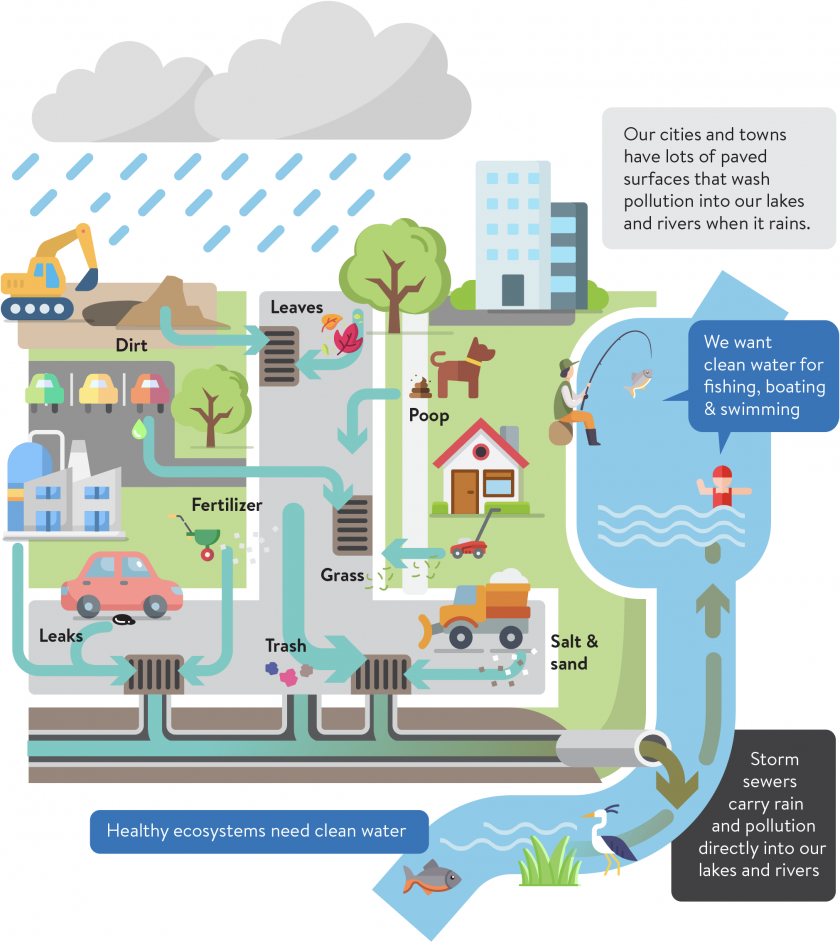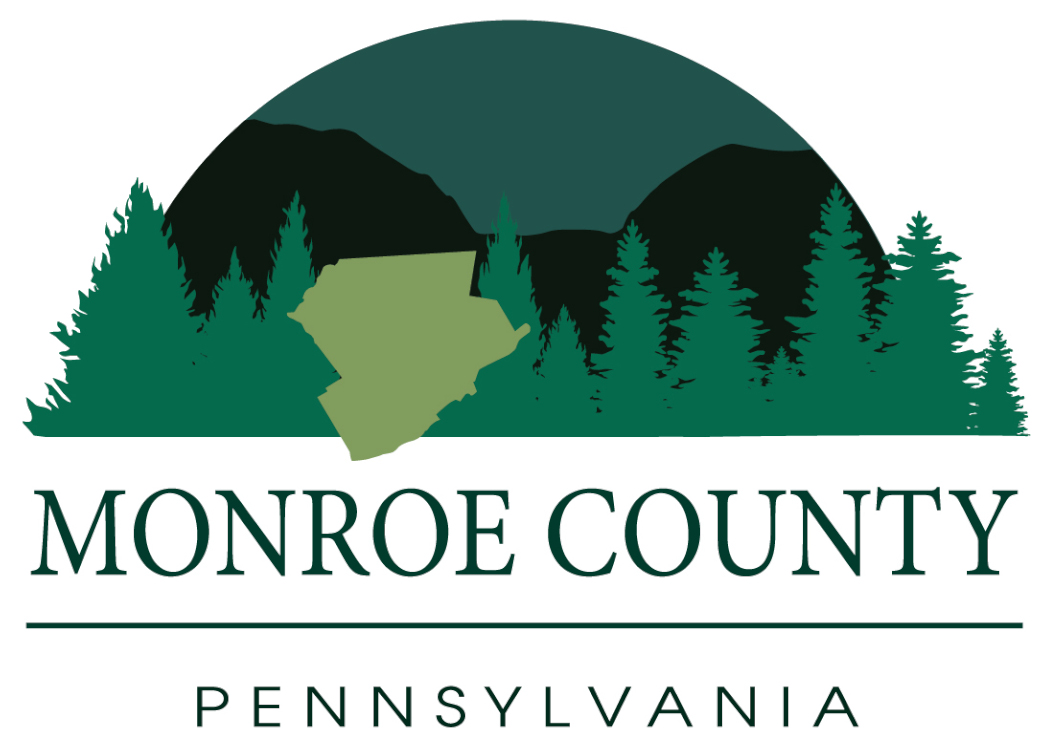As part of its water quality MS4 permit, the Borough is asking for your help to report unauthorized discharges to the streams, roads and storm sewers. The Borough is required to reduce sediment to Reservoir Run. Call the Borough office at 570-421-8300. Pamphlets, Annual Reports, and copies of the permit documents are also available at the Borough Office.
Report A Spill:
Emergency Contact List for Spill Response:
Common Spill / Illicit Discharge
Spill Reporting (8:00 a.m. -5:00 p.m. M-F): 570-421-8300
EMERGENCY or after business hours: 911

MS-4 stands for Municipal Separate Storm Sewer Systems.
A Pennsylvania Department of Environmental Protection (PA DEP) storm water discharge permit is issued to municipalities for municipally owned structures, including retention basins, ditches, roadside inlets, underground pipes and other conveyances used to control storm water runoff. East Stroudsburg Borough’s urban classification via the 2010 U.S. Census requires it to become part of the Environmental Protection Agency’s MS-4 program, managed by the PA DEP.
The key requirement of the program in the Borough of East Stroudsburg is to reduce the sediment levels in Reservoir Run, a creek that runs through the municipality. This can be accomplished through public education, inspections of outfalls, illicit discharge detection, and other preventative measures.
What is storm water runoff? Storm water is water from precipitation that flows across the ground and pavement when it rains or when snow and ice melt. The water seeps into the ground or drains into what we call storm sewers. These are the drains you see at street corners or at low points on the sides of streets. Collectively, the draining water is called storm water runoff.
Why is storm water a problem? Storm water becomes a problem when it picks up debris, chemicals, dirt, and other pollutants as it flows or when it causes flooding and erosion of stream banks. Storm water travels through a system of pipes and roadside ditches that make up storm sewer systems. It eventually flows directly to a lake, river, stream, wetland, or coastal water. All of the pollutants storm water carries along the way empty into our waters, too, because storm water does not get treated!
How can you help? Here are some tips and resources on how you can do your part:
STORM WATER MANAGEMENT
TIPS FOR RESIDENTS – PROTECT OUR WATERSHED
WHEN IT RAINS, IT DRAINS
HOMEOWNER’S GUIDE TO STORMWATER
EFFICIENT LANDSCAPING
Get the kids involved too! Here are great activities to start learning early!
ONLY RAIN DOWN THE DRAIN INTERACTIVE WEBSITE
STORMWATER ACTIVITY BOOK FOR KIDS
A FISH’S WISH ACTIVITY BOOK
BE A DRAIN RANGER COLORING BOOK
MS-4 Public Education
Effects of Storm Water Runoff
– Polluted storm water runoff can have many adverse effects on plants, fish, animals, and people
– Sediments can cloud the water and make it difficult or impossible for aquatic plants to grow. Sediment also can destroy aquatic habitats.
– Excess nutrients can cause algae blooms. When algae die, they sink to the bottom and decompose in a process that removes oxygen from the water. Fish and other aquatic organisms can’t exist in water with low dissolved oxygen levels.
– Bacteria and other pathogens can wash into swimming areas and create health hazards, often making beach closures necessary.
– Debris—plastic bags, six-pack rings, bottles, and cigarette butts—washed into water bodies can choke, suffocate, or disable aquatic life like ducks, fish, turtles, and birds.
– Household hazardous wastes like insecticides, pesticides, paint, solvents, used motor oil, and other auto fluids can poison aquatic life. Land animals and people can become sick or die from eating diseased fish and shellfish or ingesting polluted water.
– Polluted storm water often affects drinking water sources. This, in turn, can affect human health and increase drinking water treatment costs.
Be part of the solution!
As storm water flows over driveways, lawns, and sidewalks, it picks up debris, chemicals, dirt, and other pollutants. Storm water can flow into a storm sewer system or directly to a lake, stream, river, wetland, or coastal water. Anything that enters a storm sewer system is discharged untreated into the water bodies we use for swimming, fishing, and providing drinking water. Polluted runoff is the nation’s greatest threat to clean water.
By practicing healthy household habits, homeowners can keep common pollutants like pesticides, pet waste, grass clippings, and automotive fluids off the ground and out of storm water. Adopt these healthy household habits and help protect our waterways. Remember to share these habits and tips with your neighbors!
You can also help by:
* Know the impaired streams by you
* Plant a rain garden
* Plant a lot of trees, shrubs, and ground cover
* Use a rain barrel to catch and store water for gardens
* Redirect down spouts from paved areas to vegetated areas
* Install gravel trenches along driveways and patios
MS-4 Public Involvement
Why Is Public Participation and Involvement Necessary?
The public can provide valuable input and assistance to a regulated small MS-4’s municipal
storm water management program and, therefore, EPA suggests that the public be given
opportunities to play an active role in both the development and implementation of the
program. An active and involved community is crucial to the success of a storm water
management program because it allows for:
– Broader public support since citizens who participate in the development and decision
making process are partially responsible for the program and, therefore, may be less
likely to challenge the program and more likely to take an active role in its
implementation.
– Shorter implementation schedules due to fewer obstacles in the form of public and
legal challenges and increased sources in the form of citizen volunteers.
– A broader base of expertise and economic benefits since the community can be
available, and free, intellectual resource.
– A conduit to other programs as citizens involved in the storm water program
development process provide important cross-connections and relationships with other
community and government programs. This benefit is particularly valuable when trying
to implement a storm water program on a watershed basis, as encouraged by EPA.
Illicit Discharge Detection and Elimination
What is an illicit discharge? An illicit discharge is an unlawful act of disposing, dumping, spilling, emitting, or other discharge of any substance other than storm water into the storm water drainage system. The storm water drainage system includes streets, ditches, catch basins, yard inlets, lakes, and streams.
Illicit discharges cause water pollution by sending pollutants right into creeks, streams, ponds, and lakes. Be sure you know what illicit discharges are so you can help prevent water pollution and keep our streams clean!
Prevent water pollution. Call the Borough to report an illicit discharge or any type of water pollution in our streams or storm water inlets. In case of emergencies, call 911.
Examples of illicit discharge:
– Paint being poured into or near the storm drainage system
– Changing oil or antifreeze over or near a storm structure
– Washing vehicles where the runoff could drain into the storm drainage system
– Washing dumpster pads and allowing the runoff to drain into the storm drainage system
What Information Should Be Given When Reporting a Suspected Illicit Discharge?
– What is your name and best contact information? This information is kept confidential and is only used if the borough requires additional information.
– What time did you see the discharge? It is important that illicit discharges are reported immediately so the person(s) responsible can be found and the discharge can be cleaned up and corrected as soon as possible. We want to respond as quickly as possible to prevent pollution to our environment.
– Where did you see the discharge? We’ll need an address, intersection, business name, or landmark to help us quickly find the illicit discharge.
– What do you think the discharge is? Was it a paint spill, oil spill, sewer leak, or some another type of illicit discharge?
Report A Spill:
Emergency Contact List for Spill Response:
Common Spill / Illicit Discharge
Spill Reporting (8:00 a.m. -5:00 p.m. M-F): 570-421-8300
EMERGENCY or after business hours: 911

Local Resources
Trout Unlimited Brodhead Chapter
Monroe County Conservation District
